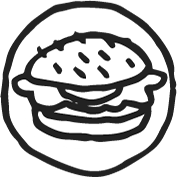

Midnight.
The bedroom door bangs open and there stands Father, his heaving shadow filling the doorframe. My heart leaps like a branded calf. “Get up,” he says, before taking a long draw from a glass bottle. I search him for a sudden lengthening of joints, a burgeoning tail, the bristle of fur, but he remains wonderfully, thankfully, himself. Father shouldn’t be drinking; it only aggravates the curse. “Get up,” he repeats. “We’re goin’ for a drive.”
Mother will bite her lip in disappointment when she hears how careless I’ve been tonight, how I fell asleep without barring my bedroom door. She was the one who taught me to hide. So many times we’d huddled together in the claw-foot tub while Father scratched and howled outside the door. Mother would run her fingers up and down my arm reassuringly, calling me her little bird, and she was right. I was a sparrow with broken wings, full of nervous twitch and flightless flutter, her polar opposite. Mother was calm, feline, all sinew, grace, and mystery. “Don’t ever let Father see you cry,” she’d warn. “Crying feeds his hunger.” Then she’d brush away my tears with her long, loose hair until my intermittent sobbing gave way to fitful sleep.
In the morning, we’d emerge to find Father sprawled across the floor, half dressed, sleeping soundly. I’d look him over for blades of grass between his toes or dried blood beneath his nails—signs that he’d been marauding the hillsides killing sheep and chicken and teenage lovers out past curfew. Mother would clean him, wake him gently, and lead him to bed. Sometimes he’d snap at her, spewing froth and foam, but she’d never hiss in return.
Right now, Mother is away on one of her excursions. “Chasing feral dreams,” she tells me, but her explanation sounds like a line from a movie. She leaves without word or warning for days at a time, returning with a face as wide and bright as the open sky.
“Did you catch your dreams?” I ask.
“Maybe next time,” she answers, before presenting me with a fantastical collection of treasures: tarantulas trapped in clear blocks of plastic resin, fossilized dinosaur turds, wreaths made entirely of human hair.
This time she’s been gone too long. I expected her back weeks ago and certainly by today, my birthday. And tonight, as Father and I drive down the dirt road in his battered truck, a small part of me believes that he’s taking me to her, that they’ve planned an elaborate surprise party at the Roller Ranch complete with a tower of gifts and a cake shaped like a roller skate, but a larger part of me knows that Mother has finally caught those elusive dreams.
The moon is close, tracking us behind the pines in silent observation. It’s not a full moon, just waxing gibbous, but that doesn’t mean much. The curse is not dependent upon lunar phases. It’s as unpredictable as the turning of the wind. Even the tinkling of my spoon in the cereal bowl could send Father into a snarling frenzy.
I almost killed Father, years ago. One morning we found him snoring on the kitchen floor, flat on his back, arms and legs outstretched like an X. I grabbed a paring knife from the drying rack, squeezed it in my bony fists, and prepared to plunge it deep into the middle of his chest. It seemed to me an easy end for Father—for all of us—but Mother rushed over and pried the knife from my fists, cutting her palm in the process. She paid the wound no mind. Instead, she grabbed me tightly by the shoulders. “Little Bird,” she whispered, “we must love Father. Love is what holds us together. Love is what will perfect us.” She then touched Father lightly upon his bare chest, perhaps to reassure herself that he was still alive. The blood from her hands left a delicate trail across his skin like a string of warm red kisses.
We finally reach town and pull up to the Food-n-Fuel. Father turns off the ignition, slides out of the cab, and ambles toward the store. Minutes later, he returns carrying an eight-pack and a greeting card envelope. He sets the beer beside my feet and tosses the envelope into my lap.
“Well, throw it out the window if you don’t want it,” Father scoffs, nodding toward the envelope, which is his distinct way of telling me that I should open it. In truth, I’m scared to because he’s never given me a card, but I do it anyway. I feel his probing eyes upon me as I pull it out. A bouquet of pastel flowers—lilies I think—decorates the front. I read the preprinted message on the inside, which has been crossed out with blue ink:
Wishing you a speedy recovery!
Below this sentiment is a handwritten note in small, surprisingly neat letters:
Happy Birthday,
Your Father, Frederick
“They didn’t have no birthday cards,” he explains. His voice is low and soft. I don’t look at Father. I don’t speak. I am only able to trace the loops and curves of his handwriting. The ink is still wet. It stains my fingertips. We are more than halfway home when I finally close the card and press my blue-tinged fingers gently against my lips.
Father switches on the radio and settles on something slow, something twangy, then rests his hand, palm side up, on the seat between us. I stare peripherally; his flesh resembles the tender underbelly of a crab. I think about the card, about Mother, about love, and roller skate cakes, and by the time we reach home, my hand is holding his, our hearts pounding to the same pulse, our blood beating together as if we are one.